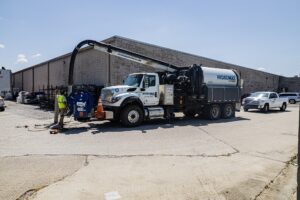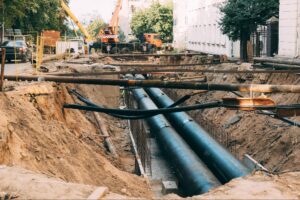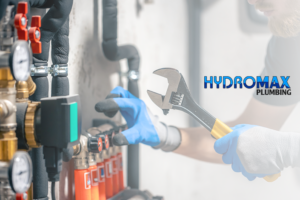In the fast-paced world of restaurant operations, grease trap maintenance often flies under the radar despite being a crucial element of a well-run kitchen. Every busy restaurant generates fats, oils, and grease (FOG) from daily cooking activities. Without proper handling, these byproducts can accumulate in your wastewater system, leading to costly blockages, unpleasant odors, fines, and even health code violations.
A grease trap is designed to intercept FOG before it enters the sewer system, but it’s only effective when cleaned and maintained regularly. While some restaurant owners may view maintenance as an avoidable expense, ongoing care saves you from expensive repairs, protects your reputation, and keeps your kitchen functioning smoothly. Let’s explore five compelling reasons why this preventive measure should be a regular part of every restaurant’s operations.
How Grease Traps Work and Why They Matter
A grease trap acts as the primary line of defense for your restaurant’s plumbing. As wastewater flows from your sinks and dishwashers, the trap cools it, allowing solids to sink to the bottom while lighter fats, oils, and grease float to the top. The clearer water in the middle then exits into the main sewer line. This simple mechanism is vital for preventing harmful substances from clogging your internal pipes or damaging the municipal sewer infrastructure.
When neglected, a grease trap will fail. FOG levels will exceed the trap’s capacity, allowing grease to escape and solidify downstream. The result is inevitable: messy, unsanitary backups that can flood your kitchen, halt service during peak hours, and lead to lost revenue. Regular maintenance ensures the trap functions efficiently, helping you avoid these preventable disasters and remain compliant with local regulations.


Benefit 1: Protecting Your Entire Plumbing Infrastructure
One of the most critical advantages of regular maintenance is its ability to protect your entire plumbing system from premature failure. The most immediate threat from unchecked FOG is the formation of stubborn clogs. As grease solidifies within your pipes, it narrows the passage for water, eventually leading to slow drains and complete blockages.
But the damage doesn’t stop there. These blockages increase the pressure within your pipes, putting significant stress on joints and connections. Over time, this elevated pressure can contribute to leaks or even pipe bursts, turning a simple clog into a far more destructive and expensive plumbing emergency.
By adhering to a consistent maintenance schedule, you remove grease deposits before they can cause harm, ensuring a stable, free-flowing system and preserving the long-term health of your plumbing components.
Benefit 2: Avoiding Fines and Ensuring Health Code Compliance
The food service industry is heavily regulated to protect public health. Local municipalities and health departments have strict rules for the disposal of fats, oils, and grease to prevent environmental contamination and sewer system damage.
For instance, the Evansville Water and Sewer Utility has a detailed policy outlining the specific requirements for grease trap installation and maintenance. Restaurants that fail to manage their FOG output properly can face steep fines, mandatory shutdowns, and lasting damage to their reputation.
Regular grease trap maintenance is a cornerstone of compliance. It ensures that FOG does not leak into the public sewer system, helping you meet your legal obligations. Partnering with a licensed commercial plumbing service simplifies this process, as they provide documentation of cleaning and proper waste disposal that can be presented during health inspections. This proactive approach helps you steer clear of violations and operate with confidence.
Benefit 3: Maintaining a Clean and Safe Environment
Cleanliness and safety are non-negotiable in any restaurant. A poorly maintained grease trap can compromise both. As a trap fills, it often releases foul, rancid odors that can permeate your kitchen and even drift into the dining area, souring the customer experience.
More importantly, an overflowing trap creates direct safety hazards. Grease spills make kitchen floors slick and treacherous, significantly increasing the risk of slips, falls, and injuries for your staff. Furthermore, stagnant, decomposing grease is a breeding ground for harmful bacteria, posing a direct threat to kitchen hygiene.
By routinely servicing your grease trap, you eliminate these risks, ensuring a clean, odor-free, and safe environment that protects employees and boosts customer confidence in your brand.
Benefit 4: Reducing Long-Term Costs
While routine maintenance has an upfront cost, it is minor compared to the financial fallout from neglect. The expenses associated with a plumbing emergency far outweigh the predictable cost of preventive care. Emergency plumber services—especially after hours or on weekends—can be exorbitant.
Beyond repairs, non-compliance can lead to crippling fines from health departments. Perhaps the most significant hidden cost is lost revenue; a flooded kitchen or a mandatory shutdown means turning customers away. Proactive maintenance should be viewed as a crucial investment in your restaurant’s financial stability, protecting your bottom line from unexpected and substantial expenses.
Benefit 5: Improving Operational Efficiency

A well-maintained grease trap contributes directly to the efficiency of your daily kitchen operations. When plumbing works as it should, your staff can focus on their primary roles: preparing excellent food and delivering outstanding service. Constant disruptions from slow drains, gurgling sinks, or sudden backups create stress, slow down the entire workflow, and can negatively impact staff morale.
By ensuring the kitchen’s plumbing infrastructure is reliable, you foster a smoother, more professional work environment. Your team can perform their duties without interruption, leading to faster ticket times, higher-quality service, and ultimately, greater customer satisfaction. A smoothly operating kitchen is a more productive and profitable one.
Establishing a Proper Grease Trap Maintenance Schedule
Creating a consistent maintenance schedule is critical to ensuring that grease traps function as designed. The cleaning frequency depends on factors such as the restaurant’s size, the type of foods prepared, and overall kitchen output. Generally, a grease trap should be serviced before FOG and solids exceed 25% of its capacity.
High-volume restaurants, particularly ones specializing in fried or oily dishes, may need weekly or biweekly maintenance. Conversely, those with modest grease production might only require monthly checkups. Keeping thorough records of maintenance activities helps demonstrate compliance and ensures your grease traps consistently perform at peak efficiency.
The Role of Licensed Professional Plumbing Services
Licensed professional plumbing services offer invaluable support by performing routine maintenance and guiding restaurant owners through the regulatory requirements of grease trap management. Their expertise in grease disposal and cleaning frequency recommendations simplifies compliance with local ordinances and health codes.
Hydromax Plumbing, a locally owned provider of Evansville Plumbing services, is well-known for its 24/7 plumbing services. Their well-trained, licensed, bonded, and insured staff can manage your grease traps based on the specific demands of your establishment. With Hydromax Plumbing, you can rest assured that every step of the maintenance process adheres to industry best practices and minimizes downtime.
Additional Services to Support Commercial Kitchens

Beyond grease trap maintenance, many restaurants benefit from a comprehensive range of plumbing services. A provider with deep expertise in commercial plumbing, such as Hydromax Plumbing, can offer assistance with drain cleaning, sewer repairs, video camera inspections, and more. These services cater to the unique needs of busy kitchens, helping you prevent minor issues from escalating into full-blown operational crises.
By choosing licensed professional plumbing services, you’ll have access to skilled technicians who understand your specific requirements and can provide immediate, reliable support.
Essential Role of Grease Trap Maintenance in Restaurant Success
Regular grease trap maintenance is not just another operational task—it’s a foundational practice for every successful restaurant. Keeping traps clean deters clogs, ensures adherence to regulations, helps maintain the effectiveness of your plumbing system, and sustains a clean, safe environment for everyone. These benefits strengthen your restaurant’s reputation and contribute to seamless daily operations.
Don’t wait for a crisis to highlight the importance of consistent care. Hydromax Plumbing is your local Evansville Plumbing expert, offering 24/7 plumbing services and extensive experience with restaurant-specific needs. If you’re ready to safeguard your establishment’s health and profitability, schedule grease trap maintenance with Hydromax Plumbing and enjoy peace of mind knowing your kitchen is operating at its very best.




